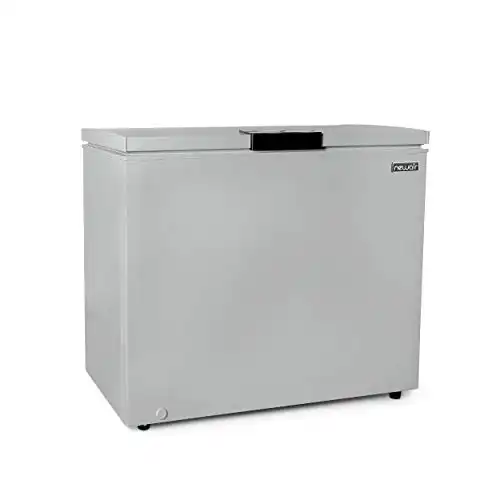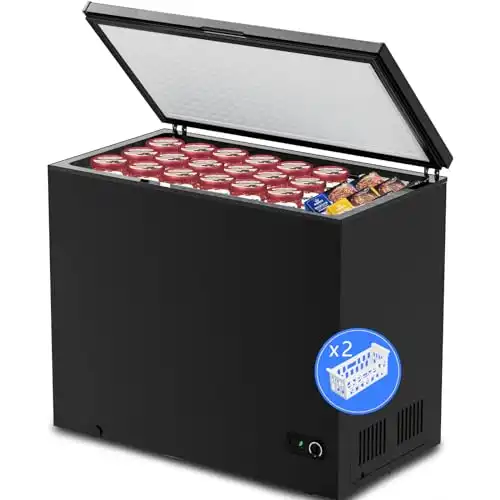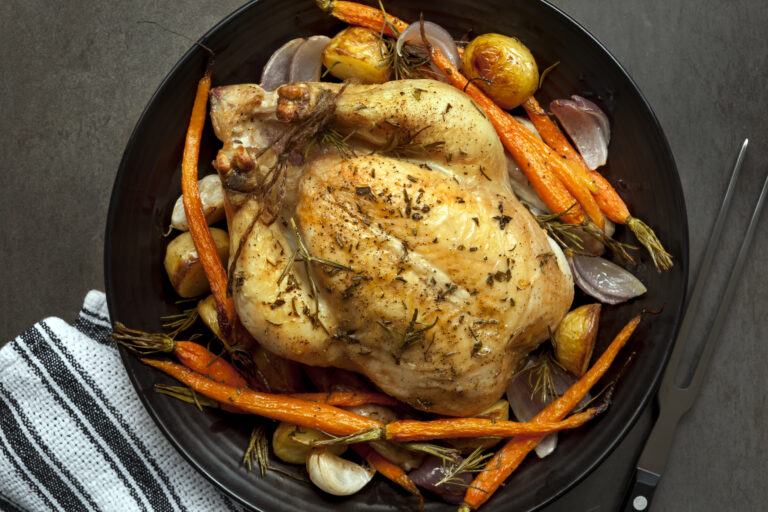10 Meat Freezer Benefits That Save You Money and Keep Food Fresh
Owning a meat freezer is budget-friendly, safe for meat storage, retains flavor, provides long-term storage, meals for guests, and preservative-free.

Having been raised by a busy working mom who could magically produce delicious meals out of thin air – I was convinced she must be a magician! Little did I know then that those “magic tricks” were stored in our trusty old meat freezer.
The benefits of owning a freezer for meat storage are that it’s budget-friendly, preserves meat safely, retains its flavor and texture, and provides long-term storage for seasonal meats. It supplies meals for unexpected guests and mid-week dinners. Frozen meat is preservative-free and nutritious.
Storing meat in a freezer and saving money may sound straightforward. Sadly, it’s not, as some cuts last longer than others. So, if you want to know my tried and tested meat-freezing hacks and some helpful tips and tricks – read on!
Investing in a freezer to store your meat is one of the most excellent decisions you will ever make! Especially if you have a large family to cook for on a tight budget. So, without further ado, here are 10 outstanding benefits to consider.
Disclosure: As an Amazon Associate, this site earns from qualifying purchases. Thank you!
1. Budget Friendly
There’s nothing more frustrating than spotting meat at a bargain basement price and not having adequate space to store it in your tiny upright freezer!
The beauty of owning a spacious meat freezer is that you can purchase large quantities of meat, like an entire side of beef (or whole cow), and divide it into roasts or juicy steaks.
While buying a lot of meat at once and going through the effort of cutting, packaging, and marking it takes time. It’s a once-off investment that can save you a lot of hard-earned money in the long run, mainly because meat is usually the most expensive aspect of your monthly food bill.
2. Food Safety
Anyone who has had nasty food poisoning will understand the importance of safely storing meat.
Like dairy, meat has the tendency to grow bacteria at a rapid rate, which can make you sick if it is stored at warmer temperatures.
So, it’s no wonder that any meat stored in a refrigerator only lasts a few days, even though it is stored in a cooler environment which slows down bacterial growth.
According to the USDA, meat frozen at an icy temperature of 0°F (-18°C) safeguards it from growing infective bacteria that cause food poisoning.
3. Meat Flavor And Texture Retention
Another significant advantage of having a meat freezer is that it retains its delicious taste and texture when stored at the correct temperature.
To illustrate this point, meat stored at warmer room temperatures will slowly break down and oxidize. As a result, it will quickly start looking grey and inedible.
Therefore, it is also recommended to thaw frozen meat in the fridge, not overnight, on your countertop.
4. Long-Term Food Storage

Meat frozen at the correct temperature can technically last forever. However, according to the
FDA and firsthand experience, meat frozen for too long will start to deteriorate over time.
So, it’s essential to know how long you can safely freeze the following fresh (raw) beef, lamb, veal, and pork meat cuts, to ensure that nothing goes to waste:
- Bacon: 1 month
- Sausages: 1–2 months
- Chops: 4–6 months
- Roasts: 4–12 months
- Steak: 6–12 months
- Including other meat cuts like tongue, chitterlings, and liver: 3–4 months
Pro-tip: before you pop your meat cuts in the freezer, add a label noting the type of meat and the date it was frozen.
Pack meats with a longer storage duration at the bottom of your freezer and those that will expire soon or are more readily used, like bacon, where it is easier to retrieve.
5. Environmentally Friendly
One aspect of owning a meat freezer, which is often overlooked, is that it reduces the number of times you must go food shopping.
Apart from decreased fuel costs, it also reduces your carbon footprint. And you don’t have to spend time looking for parking or stand in ridiculously long queues. So, it’s a win-win in my books!
6. Unexpected Guests
A freezer filled with ready-cooked meat has “saved my bacon” countless times! Especially when visitors decided to stick around at dinner time. And let’s face it, knowing that you don’t have to cook a meal from scratch is fabulous.
7. Preservative Free
It’s well-known that most of our Western diet is packed with toxic preservatives in processed foods. Frozen meat does not contain preservatives, so you can produce healthy, guilt-free meals.
8. Seasonal Meats Storage

Because we are so used to purchasing meat and fresh produce all year round, only some people realize that meat is also seasonal, like vegetables and fruit. For example, ham is traditionally enjoyed during Easter, while turkeys are a Thanksgiving staple.
Seasonal meats like venison, goose, or duck are typically cheaper than those sold out of season. So, having a big meat freezer is ideal as you can make the most of Mother Nature’s bounty and save your hard-earned cash.
9. Mid-Week Dinners
After a long day at work, knowing there is a home-cooked meal in the freezer is a lifesaver! And being able to use your meat freezer for mid-week dinners means you can spend more time focusing on ticking off your to-do list.
Pro-tip: if you have time for meal-prepping, cook your meat in bulk, portion it out in containers, pop it into your meat freezer, and put it straight into the oven or microwave at dinner time.
10. Meat Freezers Preserve Nutrients
Meat is rich in protein and nutrients like Iron, Niacin, B6, B12, Calcium, Selenium, and Zink, including several other vitamins and minerals needed for optimal health. So, combining that with other nutritious vegetables gives you a super healthy meal.
Frequently Asked Questions
What Type Of Freezer Is Best For Meat?
Even though chest freezers take up more space than upright freezers, they have a lot more space, so you can easily store odd-shaped bulky cuts of meat. Chest freezer bins are also convenient, as you can organize your cuts of meat in various compartments, making them easy to retrieve.
But, apart from space, their most significant advantage is energy efficiency. So even if the worst happens, and you have an extended power cut, your meat will stay frozen for nearly three days. And you will have a lower energy bill.
What Size Freezer Do I Need For 300 Lbs. Of Meat?
While there is lots of conflicting information about freezer sizes, you should have ample space with an 8 cubic foot freezer to store 300 Lbs. of meat.
What Size Freezer Do I Need For 200 Lbs. Of Meat?
A 5 cubic feet freezer should provide ample storage for this amount of meat.
How Big Of A Freezer Do I Need For A Beef?
A meat freezer should ideally provide 1 cubic foot of space for every 35-40 Lbs. of meat, with enough “breathing room” to accommodate oddly shaped packaged meat. The freezer should not be much bigger than the amount of meat you would like to store. Meat freezers only perform optimally if they are relatively full, with less air space.
Pro tip: when shopping for a new meat freezer, measure the space where you would like to place it, and add at least 1 inch at its width to promote airflow around the freezer.








